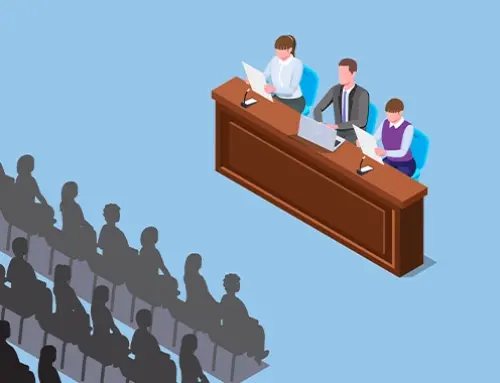Contents
How Lawyers Commit Breach of Fiduciary Duty (and What to Do)
When you employ a lawyer, you would like to see them acting in good faith on your behalf, with diligence, and with utmost transparency. This kind of obligation is known as an attorney fiduciary duty, and it is the backbone of lawyer-client relationship. A breach of fiduciary duty happens when a lawyer is unable to fulfill such obligations, which results in harm against the client. Legal systems put a high level of ethical and professional responsibility on fiduciary duty lawyers to avoid such transgressions. It is well that clients and lawyers both understand how these obligations function—and what happens when they are breached.
What Is a Lawyer’s Fiduciary Duty?
I. Definition of Fiduciary Duty in Legal Practice
A fiduciary duty is a legal obligation requiring one party to act solely in the interests of another. In the legal profession, this duty arises when an attorney enters into a relationship with a client. The lawyer assumes a position of trust and is expected to prioritize the client’s interests above all personal gain. This responsibility encompasses honesty, integrity, full disclosure, and undivided loyalty throughout the duration of the legal representation. The concept extends beyond general professional conduct, imposing a higher standard of accountability.
II. Why Fiduciary Duty Matters in Attorney-Client Relationships
The attorney-client relationship is built on trust. An attorney fiduciary duty ensures that the client’s rights, property, and confidential information are protected at every stage of the legal process. Lawyers are expected to provide sound legal advice, avoid conflicts of interest, and act with the utmost care and diligence. Any deviation from these expectations can erode the foundational trust and lead to professional and legal consequences. The legal system recognizes this duty as critical to fair and ethical practice.
III. Ethical Standards Every Fiduciary Duty Lawyer Must Follow
A fiduciary duty lawyer must adhere to strict ethical guidelines established by professional conduct rules. These include maintaining client confidentiality, exercising competent representation, avoiding conflicts of interest, and providing timely, clear communication. Lawyers must also manage client funds responsibly and avoid any appearance of impropriety. These ethical rules are enforced by legal oversight bodies, and violations can lead to disciplinary actions, including disbarment. In severe cases, a breach of fiduciary duty can result in civil litigation, where the lawyer may be held liable for damages caused to the client.

Key Legal Standards for Attorney Fiduciary Duty
I. Professional Rules Governing Lawyers
The legal profession operates under a set of codified ethical and professional conduct rules. These rules are established by state bar associations and other regulatory bodies to ensure that attorneys meet consistent standards in representing clients. They serve as a framework for acceptable conduct and outline specific responsibilities that all attorneys must observe. These obligations are not merely suggestions—they are enforceable mandates that define the scope of an attorney fiduciary duty. Compliance with these rules is essential for maintaining the integrity of the legal system and protecting client interests.
II. Core Duties: Competence, Communication, Loyalty
Core elements of fiduciary obligations include the duty of competence, communication, and loyalty. Competence refers to the attorney’s responsibility to possess the legal knowledge, skill, and preparation necessary for effective representation. Communication ensures that clients are kept informed and can make informed decisions about their legal matters. Loyalty involves placing the client’s interests ahead of any personal, financial, or third-party considerations. When these principles are not followed, a breach of fiduciary duty may occur, which can have serious consequences for both the client and the legal practitioner.
III. The Role of Confidentiality in Fiduciary Duty
Confidentiality is a cornerstone of the fiduciary relationship between a lawyer and a client. It ensures that all information shared within the attorney-client context remains protected unless the client consents to disclosure or legal exceptions apply. This duty applies not only during the course of representation but also after the attorney-client relationship ends. Any unauthorized sharing of client information can be considered a serious ethical violation. A fiduciary duty lawyer must take appropriate steps to safeguard sensitive data and uphold the client’s trust, as failure to do so can result in disciplinary action or legal claims.
Recognizing a Breach of Fiduciary Duty by a Lawyer
I. Common Signs a Lawyer Breached Fiduciary Duty
Clients may not always recognize when a lawyer has failed to uphold their legal obligations. However, there are clear warning signs that suggest a breach of fiduciary duty. These can include unexplained delays, failure to disclose critical information, handling cases with negligence, or acting in a way that benefits the lawyer at the client’s expense. Additionally, a lack of transparency in financial dealings or decisions made without client consent can further indicate a violation. Each of these signs should be taken seriously, as they may compromise the outcome of the legal matter and erode the trust that is central to the attorney-client relationship.
II. Client Harm and Its Legal Significance
In order to hold a lawyer accountable for misconduct, it must be shown that the client suffered actual harm as a result of the violation. Not every error or poor judgment qualifies as a breach; the conduct must have directly caused measurable damage. This can include financial loss, exposure to legal liability, or the undermining of a client’s legal position. Courts require that the harm be both foreseeable and a direct result of the lawyer’s breach. Establishing this connection is essential for pursuing claims and ensuring accountability within the legal profession.
III. When Fiduciary Duty Turns into Legal Misconduct
Violations of ethical duties are not limited to internal firm discipline; they can escalate into legal claims. If a fiduciary duty lawyer engages in misconduct that causes harm, the client has grounds to seek compensation or other legal remedies. Legal misconduct based on fiduciary breaches may include self-dealing, withholding information, or representing conflicting interests. When such actions are proven, they often lead to disciplinary measures, reputational damage, and potential disbarment. It is vital for clients to understand the boundaries of attorney fiduciary duty and to recognize when those boundaries have been crossed.
Real-World Examples of Attorney Fiduciary Duty Violations
I. Conflict of Interest Situations
One of the most common violations of a lawyer’s fiduciary obligations involves conflicts of interest. This occurs when an attorney represents multiple clients with opposing interests or when personal interests interfere with their professional duties. A conflict may be direct, such as representing both sides in a transaction, or indirect, such as a financial relationship that compromises objective legal advice. These situations erode trust and prevent the attorney from acting with complete loyalty. When undisclosed or improperly managed, conflicts of interest may serve as the basis for a breach of fiduciary duty, exposing the lawyer to disciplinary and civil liability.
II. Misuse of Client Funds and Property
Attorneys are often entrusted with client funds for purposes such as court fees, settlements, or other legal expenses. Strict rules govern how these funds must be held, typically requiring them to be placed in a separate trust account. Any commingling of client money with personal funds or unauthorized use of client property is a clear violation of professional conduct standards. A fiduciary duty lawyer must ensure that financial management is transparent, documented, and consistent with all applicable regulations. Misappropriation or careless handling of client assets undermines the legal profession and may result in severe consequences.
III. Failure to Inform or Act Diligently
Communication is a fundamental aspect of the attorney-client relationship. Lawyers are required to keep clients informed about significant developments, explain legal options, and respond promptly to inquiries. In addition, diligence involves consistent, timely, and thorough legal work to protect the client’s interests. When a lawyer neglects these responsibilities, it may reflect a failure to fulfill the attorney fiduciary duty. Delays, missed deadlines, or lack of communication can jeopardize legal outcomes and violate the client’s right to competent representation. Such failures not only diminish client trust but may also provide grounds for formal complaints or legal action.
Legal Actions You Can Take After a Breach
I. Filing a Legal Malpractice Lawsuit
When a client has suffered harm due to a lawyer’s misconduct, one of the most direct forms of recourse is filing a legal malpractice claim. This type of lawsuit requires the client to prove that the attorney owed a duty, that the duty was breached, and that the breach caused measurable damage. A breach of fiduciary duty is often central to these claims, especially when the lawyer’s conduct involved deceit, conflicts of interest, or mishandling of funds. Successful malpractice cases may result in monetary compensation for the client and, in some cases, punitive damages if the conduct was especially egregious.
II. Reporting to Legal Ethics Boards
Clients also have the option to file a complaint with the state bar or legal ethics board overseeing attorney conduct in their jurisdiction. These agencies are tasked with enforcing professional standards and have the authority to investigate, discipline, or even disbar attorneys who fail to uphold their obligations. A fiduciary duty lawyer who engages in unethical behavior may face penalties including suspension or permanent revocation of their license. Reporting such conduct not only addresses the specific incident but also helps maintain ethical standards across the legal profession.
III. Pursuing Fee Disputes and Arbitration
In situations where the primary concern involves billing disputes or dissatisfaction with services, arbitration may offer a faster and less adversarial resolution. Many jurisdictions require lawyers to participate in fee arbitration programs if requested by the client. These proceedings allow a neutral third party to evaluate whether the fees charged were reasonable and if the lawyer fulfilled their obligations. Clients may also raise concerns during arbitration about whether the attorney fiduciary duty was compromised in ways that affected the fairness of the representation. While arbitration may not provide the same level of remedy as a court case, it can resolve issues efficiently and without extensive litigation.
How Courts Evaluate Fiduciary Duty Breaches
I. Establishing the Attorney-Client Relationship
Before a court can evaluate whether a fiduciary duty was breached, it must be established that a formal attorney-client relationship existed. This relationship creates the foundation for legal obligations and is typically confirmed through engagement letters, ongoing legal counsel, or conduct implying mutual understanding. The existence of this relationship triggers the duties of loyalty, confidentiality, diligence, and competence. Once established, these duties are enforceable under both ethical and legal standards, forming the basis for potential claims of attorney fiduciary duty violations if misconduct is alleged.
II. Proving the Duty Was Breached
To succeed in court, the plaintiff must demonstrate that the lawyer failed to meet one or more obligations inherent in the fiduciary relationship. Courts look for evidence of specific conduct that violated the duty of care, such as negligence, failure to disclose critical information, conflicts of interest, or mishandling client funds. A breach of fiduciary duty must be clearly supported by facts that show the lawyer did not act in the client’s best interests. The evaluation is not based on general dissatisfaction but on concrete deviations from accepted professional standards.
III. Showing Causation and Damages
In addition to proving a breach, the client must show that the misconduct caused actual harm. This harm must be directly linked to the lawyer’s actions and not the result of unrelated factors. Courts require a clear line of causation between the breach and the damage suffered, whether financial, reputational, or legal in nature. A fiduciary duty lawyer who causes a client to lose a legal claim, incur unnecessary costs, or forfeit rights may be held liable. The client must also quantify the damages, which courts use to determine appropriate remedies, including compensatory or punitive awards.
Preventing a Breach: Tips for Clients and Lawyers
I. Due Diligence When Hiring a Fiduciary Duty Lawyer
Clients should conduct thorough research before retaining legal representation. This includes reviewing the lawyer’s credentials, disciplinary history, and client reviews. Asking direct questions about potential conflicts of interest, prior case outcomes, and communication practices can provide early insight into whether the lawyer is likely to uphold fiduciary responsibilities. A reputable fiduciary duty lawyer will welcome transparency and demonstrate a clear understanding of ethical obligations. This proactive approach reduces the likelihood of future disputes and supports a productive attorney-client relationship.
II. Setting Clear Expectations and Communication
Establishing a written agreement that outlines the scope of representation, fees, and responsibilities helps prevent misunderstandings. Clients should ensure that their attorney remains accessible and provides timely updates. Regular communication fosters trust and allows both parties to remain aligned throughout the legal process. If a client notices lapses in diligence or responsiveness, they should address concerns promptly and, if necessary, seek alternative representation. Clear expectations and active engagement are key to maintaining the integrity of the attorney fiduciary duty.
III. Red Flags Clients Should Watch For
Certain behaviors may signal potential ethical issues. These include reluctance to provide documentation, vague billing practices, or failure to explain legal options clearly. Clients should also be cautious if the lawyer appears to prioritize personal interests or engages in multiple representations without full disclosure. Recognizing these warning signs early can prevent further harm and facilitate timely intervention. Taking action at the first sign of a breach of fiduciary duty can protect client interests and uphold the principles of professional legal conduct.
Trust Violated: What Happens When Lawyers Cross the Line
When a lawyer enters into a professional relationship with a client, they accept not just legal responsibility but also a moral obligation to act with integrity and loyalty. The attorney fiduciary duty is designed to protect the client’s interests and ensure ethical behavior throughout the course of representation. When this duty is neglected—whether through mismanagement, dishonesty, or divided loyalties—the consequences can be significant. Clients may suffer financial loss, damaged reputations, or legal disadvantages, all stemming from a relationship that was supposed to safeguard their rights.
Understanding what constitutes a breach of fiduciary duty is essential for clients who need to take action, and for lawyers committed to maintaining trust in their practice. A fiduciary duty lawyer must consistently follow ethical standards and communicate openly to avoid legal and disciplinary repercussions. For clients, recognizing red flags early and knowing available legal remedies provides a critical path to justice. Upholding fiduciary principles strengthens the legal system as a whole, ensuring that every client receives the fair and dedicated representation they deserve.
Protecting Client Trust with the Right Legal Tools
Maintaining trust is essential in every attorney-client relationship, and avoiding a breach of fiduciary duty starts with having the right systems in place. RunSensible provides an all-in-one legal practice management solution designed to help law firms stay compliant, organized, and efficient. Whether you’re managing communication, client records, or case timelines, our platform supports the core responsibilities of every attorney fiduciary duty.
With tools for secure document storage, automated task tracking, and streamlined client intake, RunSensible empowers every fiduciary duty lawyer to uphold ethical standards and deliver reliable service. Protect your practice, enhance your workflow, and build stronger client relationships—start with RunSensible today.
FAQs
1. What qualifies as a breach of fiduciary duty by a lawyer?
A breach of fiduciary duty occurs when a lawyer fails to act in the best interests of their client. This may include actions like self-dealing, failing to disclose conflicts of interest, misusing client funds, or neglecting key responsibilities such as communication and diligence. The conduct must result in harm to the client to be legally actionable.
2. How can I prove a lawyer breached their fiduciary duty?
To prove a breach, a client must show that a fiduciary relationship existed, the lawyer failed to uphold their duties, and this failure caused measurable harm. Documentation such as emails, contracts, billing records, and expert testimony can help establish these elements in court.
3. Is every mistake by a lawyer considered a breach of fiduciary duty?
No. Not every error or poor decision qualifies as a breach. Only conduct that violates the specific duties owed to the client—such as loyalty, confidentiality, or competence—can be considered a breach. Courts also require that the breach caused actual harm to the client.
4. Can I sue a fiduciary duty lawyer for emotional distress?
In some cases, emotional distress may be part of the damages claimed, especially if the lawyer’s actions were intentional or grossly negligent. However, these claims often require additional proof and may be considered alongside other forms of harm like financial loss.
References:
- http://tempusfugitlaw.com/real-life-breach-of-fiduciary-duty-case-examples-outcomes/
- http://lamkinelderlaw.com/legal-blog/what-damages-are-available-for-breach-of-fiduciary-duty/
- http://scarincihollenbeck.com/law-firm-insights/common-examples-breach-of-fiduciary-duty
- http://eko-law.com/understanding-breach-of-fiduciary-duty/
Disclaimer: The content provided on this blog is for informational purposes only and does not constitute legal, financial, or professional advice.







